
John Hawkesworth LLD was an English writer and book editor, born in London.

Eacles imperialis, the imperial moth, is a member of the family Saturniidae and subfamily Ceratocampinae. It is found mainly in the East of South America and North America, from the center of Argentina to south Canada. The species was first described by Dru Drury in 1773.
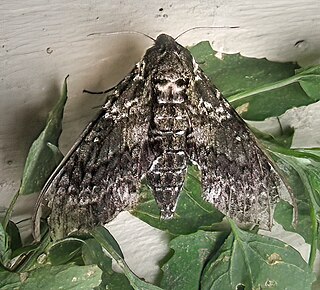
Dolba is a monotypic moth genus in the family Sphingidae erected by Francis Walker in 1856. Its only species, Dolba hyloeus, the pawpaw sphinx, was first described by Dru Drury in 1773.

Apantesis is a genus of tiger moths in the family Erebidae first described by Francis Walker in 1855. They are found in North and Central America.
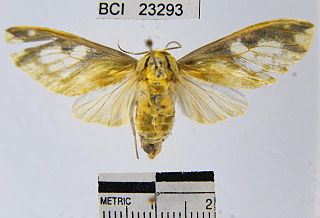
Castrica is a genus of moths in the family Erebidae. The genus was erected by William Schaus in 1896.
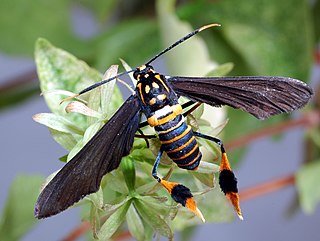
Horama is a genus of tiger moths in the family Erebidae first described by Jacob Hübner in 1819.

Speyeria, commonly known as greater fritillaries, is a genus of butterflies in the family Nymphalidae commonly found in North America, Europe, and Asia. Some authors used to consider this taxon a subgenus of Argynnis, but it has been reestablished as a separate genus in 2017.

Zale is a genus of moths in the family Erebidae erected by Jacob Hübner in 1818.

Phalaenoides is a genus of moths of the family Noctuidae. The genus was erected by John Lewin in 1805.
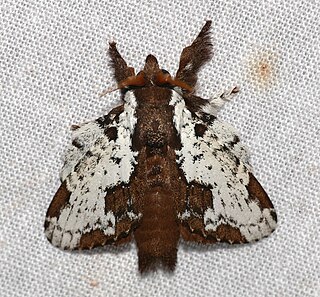
Euglyphis is a genus of moths in the family Lasiocampidae. The genus was erected by Jacob Hübner in 1820.
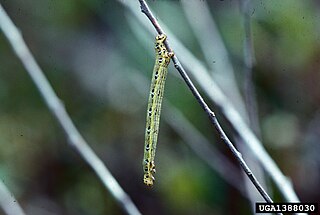
Cingilia is a monotypic moth genus in the family Geometridae erected by Francis Walker in 1862. Its only species, Cingilia catenaria, the chain-dotted geometer, chain dot geometer, chainspotted geometer or chain-spotted geometer, was first described by Dru Drury in 1773. It is found in North America from Nova Scotia south to Maryland and west to Kansas and Alberta.

Cethosia, commonly called the lacewings, is a genus of butterflies of the subfamily Heliconiinae in the family Nymphalidae. They are found mainly in southeastern Asia as far south as Australia.
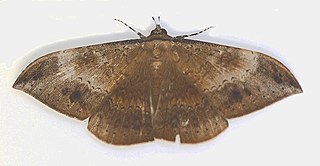
Hemeroblemma opigena is a species of moth in the family Erebidae first described by Dru Drury in 1773. The species is found from Florida to Brazil.

Argina astrea, the crotalaria podborer, is a moth of the family Erebidae. The species was first described by Dru Drury in 1773. It is found in eastern Africa, southern Asia of India, Sri Lanka, and Indo-Australia, including the Pacific Islands and Australia.
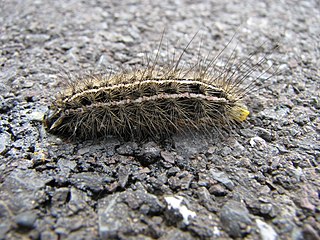
Apantesis arge, the arge moth or arge tiger moth, is a moth of the family Erebidae. The species was first described by Dru Drury in 1773. It is found in North America from Quebec and Maine to Florida, West to New Mexico, North to North Dakota and Ontario.
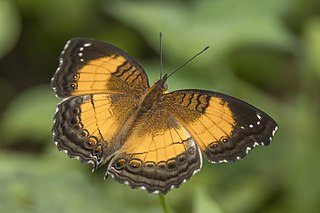
Junonia terea, the soldier pansy or soldier commodore, is a butterfly of the family Nymphalidae. The species was first described by Dru Drury in 1773. It is found in the Afrotropical realm.

Hyalurga vinosa is a moth of the family Erebidae first described by Dru Drury in 1773. It is found on Saint Kitts, Antigua, Jamaica and the Dominican Republic.

Apantesis nais, the Nais tiger moth, is a moth of the family Erebidae. It was described by Dru Drury in 1773.

Crameria is a monotypic moth genus in the family Noctuidae erected by Jacob Hübner in 1819. Its only species, Crameria amabilis, was first described by Dru Drury in 1773.

Erebus hieroglyphica is a moth of the family Erebidae. It is found from the Oriental tropical countries such as India, Pakistan, Sri Lanka, Bangladesh, Japan, China, Taiwan, Cambodia, Laos, Myanmar, Thailand, Vietnam, Indonesia, Philippines, Malaysia, Singapore, and Korea. The habitat consist of lowland forests.




















